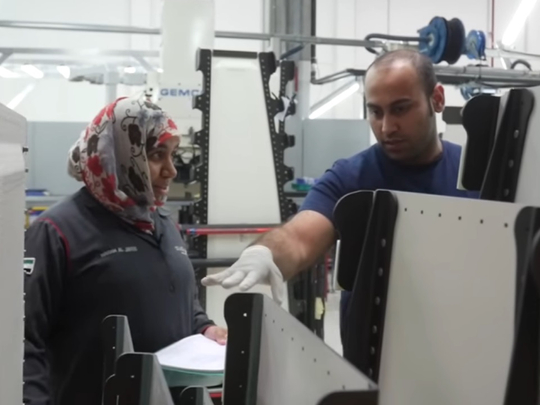
Shifting geopolitical and economic alliances worldwide are hitting manufacturing industries especially hard. The result is extreme uncertainty.
The UAE can prepare now for a disruptive economic landscape by educating Emirati students in new skills required for automated manufacturing, perhaps more than in any other field, with better career-focused technical education. Especially the kind that encourages collaboration in the classroom.
Jobs are being created again in manufacturing, thanks to these new technologies. Automation of once manual tasks is creating tremendous cost savings and are rapidly making local manufacturing more competitive than sourcing goods overseas.
Preparing the UAE youth is an important element to achieving the UAE Vision 2021 objective of a smart innovation-driven economy. And the impending skills gap in automated manufacturing technologies could be addressed through educational partnerships.
The combination of automation technologies like robotics, 3D printing, 3D laser scanning, and the internet of Things (IoT) makes it more cost-effective to source manufactured goods from closer locations.
Already, there are signs of new trade practices where suppliers of manufactured goods, global traders, merchants and consumers are based close to each other — in the same country.
The future UAE economy is a good contender to emerge as an industrial nation in such a scenario. It already has world-class sea and air ports, so all that the UAE needs is more development in manufacturing to make that happen.
D2M Solutions, headquartered in Dubai, is the Gulf’s first entity addressing the gap in technology required for automated manufacturing. D2M’s aim is to identify technological disruptions in key industries, understand their importance and assist customers to transform.
Opportunities
The opportunities are truly untapped if the UAE prioritises the skills gap in automated manufacturing.
Laser scanning technology allows users to inspect parts with unequalled mobility and flexibility no matter where and create a model of that part.
Some applications include non-destructive testing of aircraft wings, solar panels and rapid designing of prototypes for all types of products from industrial to consumer goods.
3D laser scanning is used in the UAE today.
A good example is the Strata plant in Al Ain, which employs hundreds of workers making parts for the most advanced Boeing and Airbus jets.
The UAE can prepare future Emirati engineers by demonstrating to students the real-life applications of working with these new technologies.
Such an interactive teaching approach can make the theoretical much more concrete for students. In fact, there have been some exciting developments along these lines.
Strata established a research and development arm at Khalifa University to train students in automation technologies, while NYU Abu Dhabi has an engineering design programme that uses 3D laser scanning in the classroom to demonstrate applications in engineering. But more is urgently needed.
Industry tools
Forward-thinking teachers — who look to inspire, collaborate and push the innovation envelope forward — must be encouraged to do so, and should be provided with the latest industry tools.
However, the financial reality is most educational institutions cannot afford the market price of the leading tools, and this could frustrate efforts to introduce high quality teaching materials into UAE classrooms.
Luckily, companies like Creaform (a division of Ametek) are providing amazing outreach to educational institutions by offering special collaborative solutions to lower the risk when making equipment purchases.
Creaform’s Acamedia package provides three hand-held laser scanners which the company has priced in a way that teachers can cost-effectively demonstrate the viability of integrating this technology into their curriculum.
Collaboration
By integrating free teaching kits into their classes, educators can better prepare their students — all while keeping expenses under control, and can purchase the scanners when budgets are available.
Most importantly, these collaborative solutions provide UAE educators with a complete skill-nurturing academic solution to train the manufacturing leaders of tomorrow’s UAE-made products.
Globally, automation technologies like laser scanning offer skilled workers some of the most meaningful, intellectually challenging, and well-paid jobs available today.
Hopefully, UAE youth will be introduced to automation technologies in the classroom as more institutions enter alliances with commercial companies, and students will be inspired to enter manufacturing.
— Martin Saldamando is a consultant on technology.












